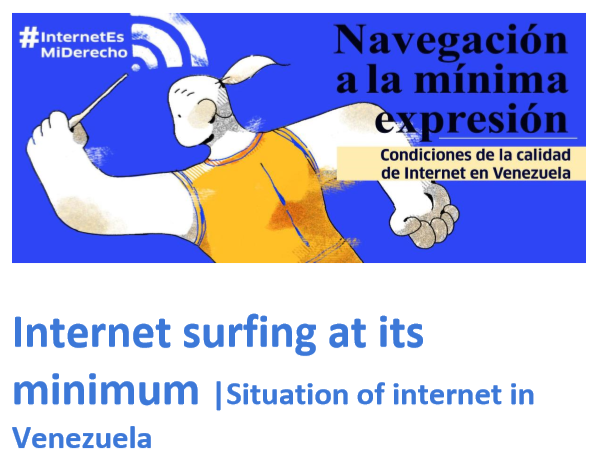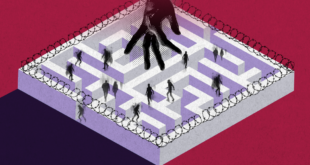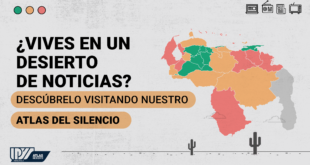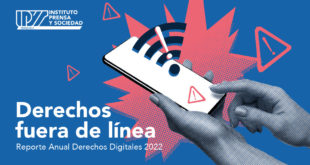-
The conditions that citizens have in Venezuela are precarious, since they exercise their freedoms online in the worst digital ecosystem in Latin America, in terms of quality of internet Access.
-
IPYS Venezuela and the MLAB internet data laboratory collected more than 6,000 speed tests on the internet in the 23 states of the country, which determined that Venezuelans surf at an average of 1.61 Mbps in fixed broadband (FBB) , the lowest figure in Latin America.

IPYS Venezuela, February, 2018
1.- A citizen problem
In the midst of the political, economic and social crisis that Venezuela is going through, citizens must take care of urgent matters such as finding medicines, solving the children’s snack to go to school, thinking how many kilometers they must walk due to the scarcity of public transport, going to several banks to look for either the lowest denomination currency bill in cash, or organize to protest the failures of a public service. Also, they think about political decisions in the face of the uncertainty and unequal conditions of the presidential elections that appear on the agenda for the coming months.
These are just some of the daily problems that are repeated in the reports of newspapers and digital media, in social networks and street commentaries that show the difficulties that citizens face due to the human rights crisis in the country.
These concerns are compounded by the difficulties that citizens have, linked to the precariousness of the Internet service, which affects their daily activities such as information, conducting banking transactions, working or communicating with their nearby networks.
The conditions that citizens have in Venezuela are precarious, since they exercise their freedom online in the worst digital ecosystem in Latin America, in terms of the quality of Internet access, according to the data of the Economic Commission for Latin America and the Caribbean (Cepal). This service, that is considered essential, has been deteriorating in the last two years. And the quality of navigation in Venezuela has dropped 0.3 Mbps in the last two years. The navigation average between January and February 2018 was 1.6 megabits per second (Mbps). This figure reflects a worsening of the conditions compared to 2016, when citizens surfed the internet at a speed of 1.9 Mbps.
While Venezuela has lost quality in the Internet connection, the average navigation of those who connect from anywhere in Latin America, was at 5.6 Mbps for the first quarter of 2017, according to data from Akamai, a corporation that is responsible for keeping records of navigation worldwide. The regional reality shows a sustained growth and in 2016 the citizens in the network consulted contents in the digital platforms at a rate of 5.3 Mbps. This shows the progress that neighboring countries have had in terms of quality of navigation on the Internet, and in this panorama Venezuela is the exception.
This is reflected in the data collected by IPYS Venezuela in its intention to evaluate the quality of connectivity in the country, on a special day that ran from January 23 to February 6, 2018. Obtaining this data was carried out through a speed test developed jointly with the Measurement Lab (MLAB) methodology, an open internet measurement laboratory, associated with the New America’s Open Technology Institute, Google Open Source Research and Princeton University’s Planet Lab, which was hosted on our website www.ipysvenezuela.org and that citizens could freely take from any computer, tablet or smartphone.
The study had the collaboration of the National Network of Correspondents and thousands of volunteer citizens, who – confidentially – joined this initiative to create a joint logbook and elaborate a diagnosis of the quality of the Internet throughout the national territory.
A series of speed tests were carried out on the Internet upload and download in the 23 states of the country, where it was found that Venezuelans surf daily at an average of 1.61 Mbps on Fixed Broadband, that is, from the traditional connections in houses, offices and other connection centers. While they can only reach 2.3 Mbps from cell phones and devices, which are connected through the Mobile Broadband (MBB).
This measurement day accounted for 360 uninterrupted hours of monitoring. The results obtained after the 6,181 tests collected are an indicator of the precariousness of navigation in the country.
Compared to the Venezuelan average speed record over the past few years, the tests were analyzed under the three categories criterion: good connection: above 4 Mbps; Medium connection: between 1 and 4 Mbps; Limited or low connection: less than 1 Mbps.
Of the total evaluated it was obtained that 10.5% presented good connection, 67.64% presented an average connection, while 21.86% limited / low connection.
At least 3 out of 10 users in this operation connected to the Internet but in conditions that are not acceptable according to international standards. That is, 2.86% of the connections registered a speed lower than 256 kilobytes per second (kbps). This speed cannot be considered Broadband according to CELAC estimates, which translates into an unacceptable connection rite. The categorization of Broadband obeys to speeds higher than 256 kbps in the case of Fixed Broadband (FBB) and at least third generation (3G) technology in Mobile Broadband (MBB).
Levels of precariousness
Cantv, which is the main state provider of Internet service in Venezuela, showed one of the biggest shortcomings in this measurement period. Its service reported an average of 2.2 Mbps of download and 5.7 Mbps of upload. The Cantv service could only be considered better against Supercable, which is a private provider, which obtained 1.04 Mbps of download and 5.3 Mbps of upload, on average, which is considered a limited condition.
The suppliers considered traditional, such as Inter, obtained the best record with an average of 2.5 Mbps of download and 9.0 Mbps of upload, which places it among the connections of medium quality.
The tests carried out in both Mobile Broadband (MBB) and fixed (FBB) showed that the operator with the best speed was Wifisolution, a telecommunications company with a dedicated internet service based in Caracas, which reported 9.6 Mbps download average and 2.8 Mbps upload, followed by NetLink América with 8.8 Mbps download and 9.6 Mbps upload. Both measurements represent unusual records compared to the average of registered connections.
The weakest points of mobile connection were reported from the connections of Digitel, which is one of the private providers. This ISP had an average of 0.2 Mbps of download and 1.01 Mbps of upload, which places it in the limited connections. This happens, despite the fact that this mobile network has fourth generation technology, known as LTE, available in 19 cities in the country. Movilnet, which is a state teleoperator, registered a deficient connection with a record of 0.8 Kbps of download and 13.6 Kbps of upload. Meanwhile, Movistar obtained a superior record with 2.8 mbps of download and 5.7 Mbps of load, which weights it as a medium connectivity, although it has a fourth generation technology reach in three cities of the country, according to IPYS Venezuela data agreement.
Centralized connection
Centralization becomes evident when analyzing the connectivity data in Venezuela. The city with a record of medium connections was Caracas with 2.8 mbps of upload and 4.3 mbps of download. In spite of being the capital of the country, it has indexes that mean half of the average of Latin America.
In addition, there is still a gap in Internet access by regions, according to official data. During the measurement period, it was observed that the sector with the greatest connectivity deficiencies was located in rural areas of Trujillo, Lara and Zulia states. In this last state, Digitel obtained the worst record of the entire measurement with 0.09 Mbps of download and 0.05 Mbps of upload. In addition to the infrastructure in these areas, there are limitations in mobile technology used by citizens.
The connections from state-owned Cantv in rural areas were below the national average and obtained 54% of the lowest connections reported, all with figures below 1 Mbps, which shows the precariousness of the service.
Meanwhile, the connections considered optimal that oscillated between more than 5 and 15 megabits per second, were selective and were reported in the Metropolitan Area of Caracas, Diego Ibarra (Carabobo), Maracaibo (Zulia), Maturin (Monagas), Ciudad Bolívar (Bolívar) ), Mérida (Mérida) Girardot Municipality (Aragua) and Jáauregui Municipality (Táchira). The majority of these tests ran under the service of the fixed networks of Inter, Netuno; Movistar’s mobile service, as well as CIX, a dedicated internet company located in the Monagas state, in the east of the country.
The peak download speed found during the 15 days of the day reached 32.1 Mbps of download and was reported in the CANTV service in the Carabobo state.
The last of the region
These shortcomings of the Internet connection have made navigation to be reduced to the minimum expression in Venezuela, while citizens have taken refuge in digital platforms and social networks as ways to bypass censorship and pressures imposed by the government, according to the analyzes that IPYS Venezuela has done. It was not fortuitous that in 2017 the report of Freedom House would qualify Venezuela as “not free” with respect to freedoms in the network, in the 2016 and 2017 periods.
The data obtained by the Measurement Lab (MLAB), between January and February 2018, also reflects the lethargy of Venezuela in terms of connectivity. The records place Venezuela in a last place in the analysis of 10 countries that this internet laboratory follows up. This country even has connection averages just below Bolivia (1.78 mbps) and Suriname (2.42mbps).
These data proved that internet surfing in Venezuela was ten times less than that of Costa Rica, and was below the quality of service offered by countries such as Panama, Peru, Guyana, Colombia and Ecuador.
This same reality is reflected by CELAC in its Report on the State of Broadband in Latin America and the Caribbean 2016, in which it reported that, at that time, Venezuela showed signs of precariousness in the quality of navigation, since 2012 the rest of Latin America ran at an internet speed with an average of 4.13 Mbps.
This positioned Venezuela as the sixth speed in South America in 2012. This situation was in decline and by the end of 2015; the country took the last place in the ranking, with an average speed of 2.31 Mbps, compared to 7.26 Mbps from the rest of the region.
2.- Port of Departure
Minimum expression: navigation log in Venezuela complements the map of the quality of the speed in the country. This research is part of a sustained effort of this organization to make a diagnosis about Internet access in Venezuela.
The methodology used was under construction from two days of collaborative measurements during the elections of 2017, October 15 (election of governors) and December 10 (election of mayors) when a series of speed tests were carried out in more than 20 states of the country, thanks to the participation of the National Network of Collaborators and citizens who joined the process.
During the electoral day of October 15, IPYS Venezuela obtained 208 tests from 17 states of the country, registering a navigation average of 1.38 Mbps. The results showed that only 3.85%, presented good connection (above 4 Mbps), 31.73% presented an average connection of (1 Mbps up to 4 Mbps) and 64.42% limited / low connection “(below 1 Mbps).
In the measurement of December 10, 326 tests were recorded in 20 states for a navigation average of 1.5 Mbps. 8.2% presented good connection, 24% presented an average connection and 67.8% limited / low connection below 1 Mbps.
In the most recent day, the variation with respect to the measurements made in the electoral contexts of 2017 was minimal, going from 1.38 Mbps and 1.5 Mbps, respectively, to 1.61 Mbps during the monitoring days in January and February 2018. This data shows that there is no discrepancy in the conditions of the service in days of high saturation, such as electoral processes, to those considered normal that have had follow-up in continuous days.
3.- Navigation compass
The capability of broadband to leverage economic, political and social development has been a priority for international organizations and governments from different latitudes. Various agencies have bet on the development of access to information and the development of the society of knowledge for which Broadband, the Internet’s navigation highway, plays a fundamental role, because it has helped in the process of empowerment of less favored sectors and democratic deliberation.
In Venezuela, the freedom of the network has been threatened in recent years by slowing down the speed of the internet, blocking of web portals and restrictions on social network platforms during periods of political and social conflict. All this, in a scenario in which the Venezuelan government has reacted to the migration of audiences that have abandoned traditional media as a primary source of information, to take refuge in the web seeking to circumvent measures of censorship and self-censorship.
Internet connectivity in the country has been falling to minimum levels during the last five years, in terms of affordability and accessibility. IPYS Venezuela determined in 2016, with the research Navigate with Freedom: Perspectives of the network in Venezuela that it was observed a decrease in the speed of the connections that for 2012 was located at 1.95 Mbps.
The crisis in the network
The deepening of the economic crisis in Venezuela during 2017 limited freedom in the network even more. Exchange control and economic restrictions, as well as inflation rates and the debt that the State accumulates with international suppliers in the telecommunications sector, has caused the acceleration of the decline of the industry and, consequently, the quality of access and quality of the connections, according to the analysis carried out by specialists and technicians from the Internet and telecommunications area.
This is added to the stagnation of the country in the geographical coverage. The official figure of internet penetration in Venezuela is 62%, according to the National Telecommunications Commission (Conatel) until the first quarter of 2017. While the number of active users is estimated at 16.401.033 which means a decrease of 3.630.558 users in the last two years. This figure also reflects that more than 15 million Venezuelans, who represent half the population, are disconnected.
The figures of penetration of the mobile broadband during the last years in the country have presented a decrease according to the estimations of Akamai in its report “State of the Internet – Connectivity Report, Q1 2017,” that was of 102% in the year 2012 , to 87% in 2016.
According to Conatel official figures of subscribers to mobile telephone service in 2016 and 2017, there are an estimated 86 active lines per 100 inhabitants. Movilnet is the supplier that presents 48.6% of the market, while Movistar (Telefónica) holds 35.4% and Digitel 16.0%.
The total subscribers of mobile telephone service for 2017 stood at 28.451.182, about 529.594 fewer users than for 2016, when the figure closed at 28,980,776 subscribers.
Since 2014 there has been a progressive decrease in subscribers to mobile lines, going from 32,019,086 (2014), to 30,633,542 (2015), 28,980,776 (2016) and 28,451,182 (2017) for a total of 2 million 182 thousand 360 subscribers less in the last 4 years.
In 2016, representatives of Digitel and Movistar teleoperators declared that, as a result of the exchange controls, they had been forced to stop their investments in the necessary maintenance of the networks; therefore, they had to eliminate international long distance and roaming services.
Maximum Alert
The Chamber of Telecommunications Services Companies (Casetel) has warned of an imminent collapse of the sector since 2013, due to the little investment to renew the technological platform, the inability to access foreign currency, in a market in which the maintenance of a large part of this area is done in dollars, this along with the strong distortion between the real costs of the service and the billing canceled by the user.
For 2016, it was estimated that the annual liquidation of foreign currency to keep operations at an optimum level should be between 1 billion and 1.5 billion dollars due to the high dependence on imported components and international maintenance services. However, according to information from the official spokespersons of the sector, since 2013 the companies have not received settlements in foreign currency by the body in charge of the allocations, that is, the National Center of Foreign Trade (Cencoex).
Ricardo Martínez, president of Casetel in 2017 in an interview with the newspaper El Nacional, said that this problem is a consequence of the debt that has been accumulated by the Venezuelan State, with international suppliers of telecommunication companies that for 2016 was estimated at 700 million dollars. Another factor that, in his opinion, affects is the lack of reinvestment in this sector, which prevents maintaining a quality service and the progress of technology in the region.
Martínez pointed out that the exodus of skilled talent in the telecommunications sector is another cornerstone of the collapse of the service, since it estimates that in the last five years there has been an increase in the fleeing of specialized technical talent that has decided to migrate from the country, or retire from formal jobs to join “freelance” positions at the service of international companies. Martínez does not fail to point out the damages to infrastructures. He points out that technology platforms suffer daily attacks and criminal acts against structures, radio bases, equipment, transformers that affect thousands of users and to this is added the impossibility of replacing damaged parts due to lack of foreign currency.
During 2017 and early 2018 users in more than 19 states have reported failures of different types due to vandalism, which removes fiber optic cables, pipes, copper cables, batteries, motor generators, switches and alarm systems to be sold in the black market.
Another factor, according to Martinez, is related to tariffs, due to the lag of costs with respect to the accelerated movement of the Venezuelan economy.
In November 2017, after more than two years of frozen tariffs, Cantv along with the three mobile telephone operators that work in the country, Movistar, Digitel and Movilnet completed the increase in their Internet plans, mobile phone packages and data.
On top of this, there are affordability difficulties. Due to economic restrictions, citizens have less purchasing power to buy mobile devices with third or fourth generation technology, according to what several analysts have referred. This becomes a problem when analyzing that the figures of Conatel indicate that Venezuelans, for the most part, access the Internet through cell phones. For 2017, subscribers who made use of the service network through the MBB represented 81.15%.
4.- Regressive measures
To the deterioration of the quality of Internet browsing in Venezuela, political restrictions were added to the freedoms in the network in Venezuela, which were taken in 2017, a year marked by conflicts and constant human rights violations. In May, in the context of a wave of street protests, the President of the Republic, Nicolás Maduro, signed a decree to extend the State of Emergency and Economic Emergency, which has been in force since May 2016, which includes the implementation of Internet censorship and control measures in order to avoid presumed “destabilization campaigns”.
There were also measures that violate the right to privacy. At the end of October, the administrative ruling No. 171 of Conatel entered into force, a regulation that saw light without having gone through the regular channels of legislative controls in the country and that violates the right to privacy. This publication established the new information that will be required at the time of contracting a telephone line, according to an analysis carried out by Derechos Digitales.
Marianne Díaz, Venezuelan lawyer and researcher in Internet affairs, in her report for Derechos Digitales explained that Venezuelan citizens or foreigners in compliance with the Providence No. 572 of March 21, 2005, should consign the identity document, signature, fingerprint , and provide full name and address of the contracting party; With the new regulations, the Single Registry of Tax Information (RIF), e-mail and a passport-size photo must be presented, which must be taken at the site where the service is contracted. In the case of foreigners, the requirements will include a copy of the passport, email address, signature, fingerprint, photograph, and a service invoice with the name that reflects domicile address in Venezuela.
The information will be obtained by telephone operators in digital form through biometric readers or fingerprint readers, such as those implemented in electoral and food systems.
In 2017, while citizens saw frequent deteriorations in their browsing quality, there were repeated political control measures that affect the Internet environment in Venezuela. The turning point came with the approval of the Anti-hate Policy. In November, the National Constituent Assembly (ANC), a body created outside the national constitution, which functions as a “supra-power” with all of the ruling parliamentarians, approved the “Law against hatred, for peaceful coexistence and tolerance”. This legal instrument contemplates regressive issues in normative matters of traditional and digital communications media.
The Inter-American Commission on Human Rights (IACHR) in its recent report on Venezuela, called on the Venezuelan State to reestablish a democratic order and annul the “Constitutional Law for the Promotion and Guarantee of Peaceful Coexistence” as being contrary to the principles of international law for human rights.
5.- Free, open and inclusive Internet
The Special Rapporteur office for Freedom of Expression of the IACHR has recognized on the Internet an indispensable instrument for the full exercise of human rights and for the contribution of social benefits and greater inclusion. In light of the increase in measures that violate these rights, it is urgent to bet on citizen empowerment capable of recognizing the importance of preserving their freedoms.
Human rights find on the Internet an instrument to increase their potential and reach the most vulnerable sectors of the population. In its report Freedom of Expression and Internet 2013, the rapporteur stresses that universal access is a principle to guarantee connectivity and equitable access, affordable and of adequate quality to the Internet infrastructure throughout the national territory and that it serves as a tool to close the digital gap.
It also comes into play the neutrality in the network that completes the principles of freedom of expression on the internet as a condition to preserve the freedom of access and the choice to send, receive or offer content without being addressed or restricted, by blocking , filtering, or interference.
Infrastructure failures
The Eighth Universal Service Project “National Transport Network” (Opsut), was a plan announced in 2009, by the then Minister of Popular Power for Science, Technology and Intermediate Industries, Jesse Chacón, accompanied by the president of Cantv for the date Franco Silva. With an investment of 2.418.846.549.17 Bolivars (approximately 400 million dollars for the date), it was named the largest telecommunications project in Latin America and it was expected to consolidate a 6.886.22 km fiber optic extension to the state, for the interconnection of the north with the south of the country through the Orinoco-Apure axis and the North-Plaine axis.
Initially, according to a 2009 press release consulted by IPYS Venezuela on Cantv’s website, the work was assigned by Conatel to state operator Cantv, Huawei, Alcatel-Lucent and Portugal’s Teixeira Duarte and associates, who were to complete it in 2012. However, in December 2013, Conatel reported in a statement on its website that it had reached 70.2%, since then no more updated information on the project has been offered.
José María De Viana, former president of Movilnet and expert in telecommunications, pointed out in 2016 for an interview in the newspaper El Nacional, the lag in which the Venezuelan market of mobile telephone service is plunged. He noted that while the use of 5G technology was already being implemented in the region, only the private Digitel and Movistar companies offered 4G service in only a few cities, while Movilnet, which had about half of the service users in the country, operated with second-generation technology, CDMA.
Venezuelan Network
In 2017, Conatel reported that 13.517.785 subscribers had smart devices, 57.91% with an Android operating terminal, 12.80% Blackberry, 3.83% iOS, 0.86% Windows and 24.61 others.
Of all the subscribers with smartphones, 74.61% remained in GSM technology, 21.17% in CDMA and only 4.2% in the advanced technology LTE network.
IPYS Venezuela consulted the public information offered by the National Mobile Broadband operators on their web pages and found that the operator Movistar only offers 4G service in three cities of the country: Capital District (Caracas), Anzoátegui (Barcelona and Puerto la Cruz) .
Digitel’s 4G LTE technology is provided in 19 cities, Capital District (Caracas), Portuguesa (Araure), Lara (Barquisimeto, Cabudare), Vargas (Caraballeda, Catia, La Macuto, Maiquetía, Naiguatá) Carabobo (Guacara, Valencia, Puerto Cabello ) Aragua (Maracay, Turmero, La Victoria, Cagua) and Zulia (Maracaibo, Cabimas and Ciudad Ojeda). While Movilnet does not offer information about the coverage of its services.
These providers together would be covering 8 states of the country with 4G LTE technology, representing only 34.7% of the entire national territory.
For De Viana after the nationalization of the National Telephone Company of Venezuela (Cantv) began the deterioration of the largest company in the sector, owner of the largest fiber optic network and main service provider to the industry, which led to lethal incidents in the industry.
To date Cantv remains the largest provider in the traditional internet market in the country with 69.5% of total subscribers, followed by Inter with 8.8%, Digitel 8.7%, Movistar 6.8% , Movilnet 4.6% and others 1.7%:
The Cantv company was nationalized in 2007, and two years later, the decline of the Development Index of Digital Ecosystems of Venezuela began, according to the study released in 2017 by the Andean Development Corporation (CAF).
That date would coincide with the enactment of Decree 6,649, in March 2009 prompted by President Hugo Chávez, which detailed the Presidential Instructions for the Elimination of sumptuary or superfluous spending in the national public sector, and which included the impossibility of acquisition without prior authorization from the Executive Vice-president and exposition of motives of cellular telephone services, and of direct international dialing, of equipment and technological platforms, as well as of the use of Internet in the public sector.
6.- Nautical chart: research methodology
This research Minimum expression: navigation log in Venezuela started in the light of the development of a systematic and automated category monitoring system around the limitations of digital rights and restrictions on the neutrality of the network in the territory of Venezuela.
Within the framework of this system, IPYS Venezuela undertook this research to analyze the conditions of the quality of internet browsing in Venezuela, with a national coverage, in the fixed broadband (FBB) and mobile broadband (MBB) modalities.
-The measurement was made during a period of 15 days, between January 23 to February 6 2018 and covered the 23 states of the national territory.
–The sample constituted 6,187 measurements that were distributed among collaborators, made by citizens from urban, suburban and rural areas of the 23 states of the country.
-The tests were developed through a web application available on the IPYS Venezuela portal developed by the Open Technology Institute (OTI) and MLAB collaborators. This alliance arose from the need to raise the map of navigation in Venezuela. It corresponds to an NDT (network diagnostic tool) that reports upload and download speeds and tries to determine which problems limit the speeds.
– The analysis criteria were related to the disaggregation of the internet providers in Venezuela, fixed and mobile, as well as the location, the date and time of the test, and the uploading and unloading speeds. This last indicator was taken as a reference to determine the quality of real navigation. The reference unit of measure was megabits per second (Mbps). The metrics reported were: download performance (Mbps), upload performance (Mbps), round trip time (ms).
– The tests were developed under security protocols and the technical team protects the confidentiality of the collaborators.
– The research was developed by a multidisciplinary group involving journalists, web developers, systems engineers and digital rights activists.
– The measurements were accompanied by a communication campaign for 15 days to encourage citizen participation.
– There was a team of collaborators to collect and confirm data in the Metropolitan Area of Caracas, in urban and suburban sectors, as it is the area with the highest population density in the country.
7.- Challenges of navigation
This research shows nine challenges that Venezuela has to ensure a higher quality of navigation in Venezuela:
The capacity of broadband to promote economic and social development, as well as to stimulate political transformations, which is a fact assimilated by many countries. The United Nations (UN) has recognized universal and affordable Internet access in the least developed countries among its Sustainable Development Goals (SDG) 2015-2030.
- Venezuela is currently facing an economic slowdown, and is going through a complex political and social crisis. From IPYS Venezuela we bet to work in consolidating the diagnosis of the public problems facing the country in terms of Internet connection, as well as the construction of alternatives and search for solutions that translate into broad guarantees of digital rights for citizens.
- There is an urgent need in the country for an articulated plan of public policies to promote access to a quality internet of wide national coverage. CELAC in its State of broadband in Latin America and the Caribbean 2016 includes a list of digital agendas in Latin America and the Caribbean that accounts for the long-term proposals of the countries of the region. The five themes most addressed by these countries are: infrastructure, electronic government and ICT diffusion, digital innovation, universal access and quality connectivity. However, Venezuela is not included in the list because it does not have a defined public policy plan on the matter.
- That authorities act in favor of equal opportunities, given that approximately 40% of Venezuelans still do not have access to the Internet, especially in rural areas. Secondly, a more accessible and affordable broadband should be sought, translated into public policies that improve access, quality of service and this can have an impact on greater social inclusion, productivity and transparency in the sector of digital governance.
- We demand authorities to work on the promotion of tools that encourage and foster the investment of both public and private actors, healthy competition and the deployment of fiber optic networks throughout the national territory.
- It is necessary to implement a strategy of systematic follow-up of investment plans aimed at expanding the infrastructure for securing broadband in rural areas and in specific sectors such as local public institutions, schools, and public health centers.
- We must stop thinking of technology investment as a “luxury expense” and understand that effective broadband policies can serve as a catalyst to increase digital dividends in the context of an economic crisis where diversification of incomes is sought.
- Affordability constitutes one of the obstacles to the expansion of the sector at this time. Although the broadband service providers in the country make an effort to provide different voice and data packages for both the FBB and the Mbb, the high cost of mobile equipment, tablets and computers has become an obstacle insurmountable for most Venezuelans who cannot allocate part of their budgets to these devices.
- Regulatory frameworks that violate the freedom of expression and opinion of Venezuelans should be eliminated immediately, since they violate the principles and human rights of freedom in the network.
At IPYS Venezuela we want to cooperate with the understanding of the Internet as a human right and a new center of social interactions. Our greatest aspiration is to contribute to the construction of a more democratic network with greater freedoms. With more plurality and less censorship, with more rights and less persecution, where there is more expression and less pressure, and for that we continue betting.
Work Team
Marianela Balbi, Executive director
Mariengracia Chirinos, Project Coordinator
Scarlet Clemente, Digital rights researcher
Chris Ritzo, Development and data analysis
Francisco Colmenarez,José Gregorio García y José Ricardo Suárez, Technical support
Maruja Dagnino, Communications director
Aura García, Social Media
Carolina Carrera, Strategic planning director
MLAB / OTI, Technical consultancies
Carlos Medina, Statistics consulting
Documents consulted
Rojas, E, L. Poveda & Grimblatt, N (2016). State of broadband in Latin America and the Caribbean 2016: CELAC. (Estado de la banda ancha en América Latina y el Caribe 2016: CEPAL.)
OCDE, BID (2016). Broadband policies for Latin America and the Caribbean: A manual for the digital economy. (Políticas de banda ancha para América Latina y el Caribe: Un manual para la economía digital.) Available at: https://publications.iadb.org/bitstream/handle/11319/8249/Politicas-de-banda-ancha-para-America-Latina-y-el-Caribe-un-manual-para-la-economia-digital.PDF?sequence=1
Oficial Documents
Conatel. (2015) Annual indicators 2014. (Indicadores anuales 2014). Available at: http://www.conatel.gob.ve/files/Indicadores/indicadores_2014/CIFRAS_I-2014_COMPLETO.pdf
Conatel. (2017) Report Figures of the Sector Second Quarter 2017 (Informe Cifras del Sector Segundo Trimestre 2017.) Available at: http://www.conatel.gob.ve/informe-cifras-del-sector-tercer-trimestre-2016/
Conatel. (2017) Main indicators of the sector year 2016. (Principales indicadores del sector año 2016.) Available at: http://www.conatel.gob.ve/estadisticas-anuales-y-trimestrales/
Ministry of Popular Power for Science, Technology and Intermediate Industries (2007). National Plan for Telecommunications, Information Technology and Postal Services PNTI y SP 2007-2013. (Ministerio del Poder Popular para la Ciencia, Tecnología e Industrias intermedias (2007). Plan Nacional de Telecomunicaciones, Informática y Servicios Postales – PNTI y SP 2007-2013)
Official Gazette of the Bolivarian Republic of Venezuela. Nº 38.146, March 28, 2009. Extracted on February 4, 2018 from: (Gaceta Oficial de la República Bolivariana de Venezuela. Nº 38.146, Marzo 28, 2009. Extraído el 4 de febrero de 2018 de): http://www.inapymi.gob.ve/documentos/39146%20instructivo%20gastos%20suntuarios.pdf
Ministry of Popular Power for Communication and Information (2009). National Transport Network. Eighth Project-FSU. Ministerio del Poder Popular para la Comunicación y la información (2009). Red Nacional de Transporte. Octavo Proyecto-FSU.
Reports
Freedom House (2017) Freedom on the Net.A Global Assessment of Internet and Digital Media Freedom. Venezuela. Available at: https://freedomhouse.org/report/freedom-world/2017/venezuela
Katz, R. (2015). The ecosystem and the digital economy in Latin America. (El ecosistema y la economía digital en América Latina.) Barcelona: Editorial Ariel; Fundación Telefónica; Editorial Planeta. Available at: http://scioteca.caf.com/handle/123456789/768
IPYS (2016). Navigate with Freedom- Perspectives of the network in Venezuela. (Navegar con Libertad- Perspectivas de la red en Venezuela). Available at: https://ipysvenezuela.org/navegarconlibertad/
Media Web
IPYS (2016). Navigate with Freedom- Perspectives of the network in Venezuela. (Navegar con Libertad- Perspectivas de la red en Venezuela). Available at: https://ipysvenezuela.org/navegarconlibertad/
IPYS (2017). With the norm Against Hatred, the Venezuelan Government deepens regulations in social networks. (Con la norma Contra el Odio, el Gobierno venezolano profundiza regulaciones en redes sociales.) Available at: https://ipysvenezuela.org/alerta/gobierno-venezolano-profundiza-regulaciones-redes-sociales/
El Nacional (Noviembre 14, 2016) Lack of dollars slows internet browsing speed and mobile connection. (Falta de dólares desacelera velocidad de navegación en Internet y conexión móvil.) Available at: http://www.el-nacional.com/noticias/economia/falta-dolares-desacelera-velocidad-navegacion-internet-conexion-movil_4848
Cantv (Noviembre, 11, 2009) Available at: http://www.cantv.com.ve/seccion.asp?pid=&sid=144¬id=3563
Telesemana (Febrero, 2, 2014) Construction of the Venezuelan National Transport Network reached 70% in 2013.(Construcción de Red Nacional de Transporte venezolana llegó al 70% en 2013.) Available at: http://www.telesemana.com/blog/2014/02/04/construccion-de-red-nacional-de-transporte-venezolana-llego-al-70-en-2013/
Download the English version of Internet surfing at its minimum | Situation of internet in Venezuela here Surfing-at-its-minimum-1.pdf

 IPYS Instituto Prensa y Sociedad Venezuela
IPYS Instituto Prensa y Sociedad Venezuela



